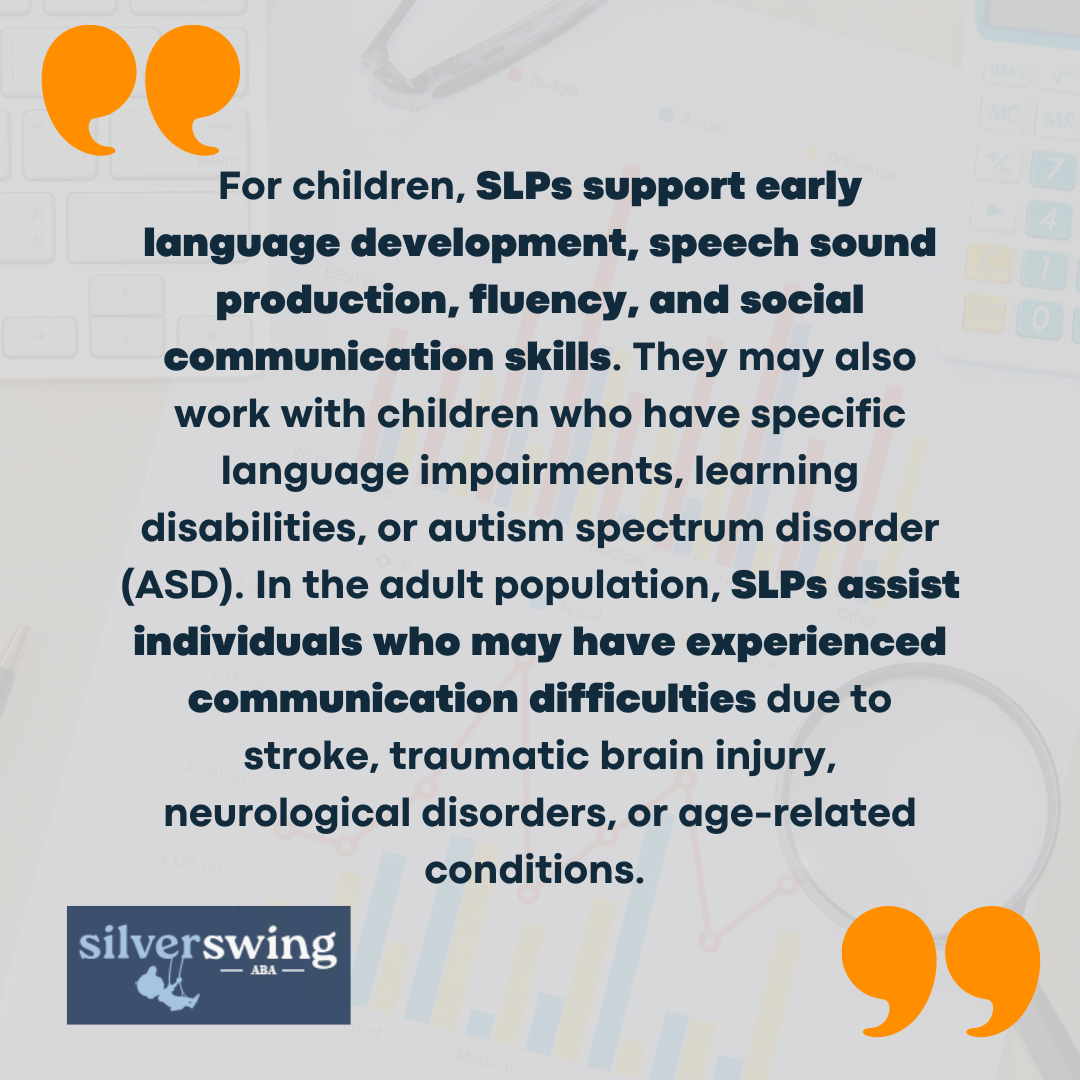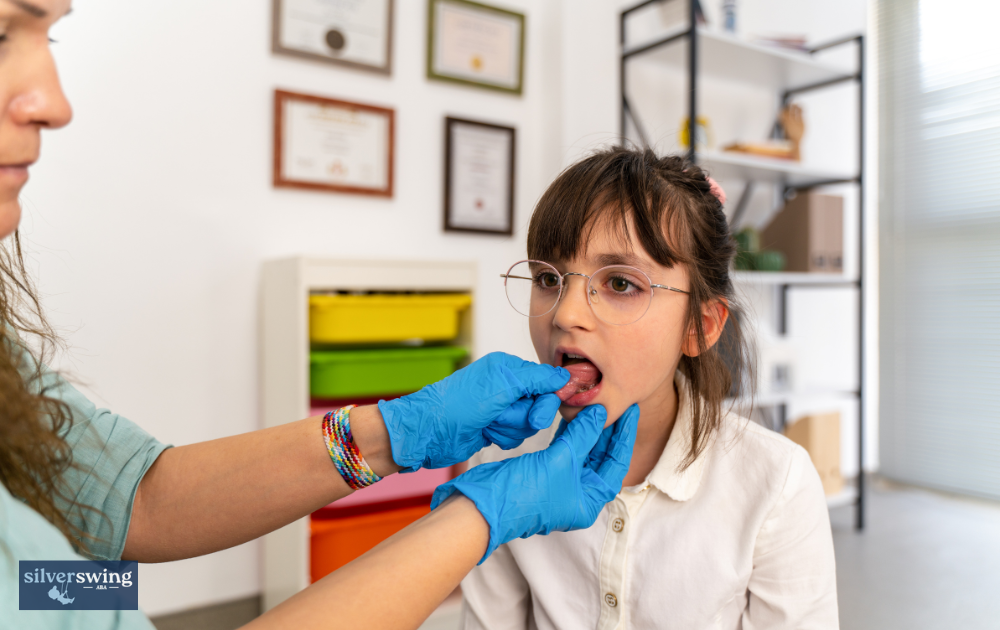Speech-language pathologists (SLPs) play a vital role in the assessment, diagnosis, and treatment of various communication disorders, including those with non-verbal autism. They work with individuals of all ages, from infants to older adults, to address speech, language, social communication, cognitive-communication, and swallowing difficulties.
With that in mind, what exactly do they do? Let’s find out.

Scope of Practice
Speech-language pathologists are highly skilled professionals who are trained to prevent, assess, diagnose, and treat a wide range of communication and swallowing disorders. They work with individuals who may experience difficulties in areas such as articulation (speech sound production), language development, literacy, fluency (stuttering), social communication, cognition, and feeding and swallowing issues.
SLPs utilize evidence-based practices and specialized techniques to address these challenges and improve overall communication abilities.
The scope of practice for SLPs includes assessing and diagnosing communication disorders, developing individualized treatment plans, and implementing tailored interventions to meet the unique needs of their clients. They work collaboratively with individuals, families, and other healthcare professionals to maximize communication potential and enhance overall quality of life.
Age Range of Clients
Speech-language pathologists work with individuals of all ages, across the entire lifespan. From infants to older adults, SLPs are equipped to address communication disorders at every stage of life. They adapt their assessment and treatment approaches to cater to the developmental and functional needs of their clients.

They focus on improving speech clarity, language comprehension and expression, cognitive-communication skills, and swallowing abilities.
By working with individuals of all ages, speech-language pathologists contribute to the well-being and communication success of their clients across the lifespan. Their expertise and interventions are tailored to address specific challenges and promote optimal communication and swallowing abilities.

Responsibilities of Speech-Language Pathologists
Speech-language pathologists play a vital role in the assessment and treatment of communication disorders. Their responsibilities encompass various aspects which include the following:
Assessment of Communication Disorders
One of the primary responsibilities of speech-language pathologists is to conduct comprehensive assessments to identify the underlying causes of communication disorders. These disorders can encompass a wide range of areas, such as speech articulation, language comprehension, voice quality, and fluency.
By utilizing standardized tests, observation, and interviews, speech-language pathologists gather valuable information to determine the specific challenges individuals may face in their communication skills.
Through these assessments, speech-language pathologists can pinpoint the areas of difficulty and develop a deeper understanding of the individual’s unique needs. This information serves as a foundation for the creation of personalized treatment plans.
Tailored Interventions
Based on the assessments conducted, speech-language pathologists design individualized interventions to address the specific communication needs of their clients. These interventions may involve a variety of exercises, activities, and strategies aimed at enhancing communication skills.
For individuals with speech articulation difficulties, speech-language pathologists may focus on exercises that target specific sounds or speech patterns. In cases where language comprehension is a challenge, interventions may include activities that promote vocabulary development, sentence structure, and understanding of grammar rules.
Tailored interventions also take into consideration the individual’s age, cognitive abilities, and personal goals. Speech-language pathologists work closely with their clients to ensure that the interventions are engaging, effective, and tailored to their unique circumstances.
Collaboration with Healthcare Professionals
Speech-language pathologists also collaborate with other healthcare professionals, educators, and families to create a holistic approach to communication care. This collaboration is vital in providing comprehensive support to individuals with communication disorders.
By working together with other professionals, speech-language pathologists can share valuable insights and expertise, contributing to a multidisciplinary team effort. They provide guidance on effective communication strategies, augmentative communication devices, and support systems that facilitate improved language development.
Collaboration between speech-language pathologists and healthcare professionals, educators, and families is crucial for ensuring consistent support and continuity of care. By working together, they can create an environment that fosters effective communication and helps individuals with communication disorders thrive.

Impact of Speech-Language Pathologists
Speech-language pathologists play a vital role in diagnosing and treating communication disorders, making a significant impact on the lives of individuals they work with.
Their expertise and support encompass various aspects of communication, including providing communication support and advocating for individuals.
Communication Support
One of the key impacts of speech-language pathologists is their ability to provide communication support to individuals with communication disorders. They conduct thorough assessments to identify the root causes of these disorders, such as speech articulation, language comprehension, voice quality, and fluency.
Based on these assessments, they design tailored interventions that may include exercises, activities, and strategies to enhance communication skills.
Through targeted therapy sessions, speech-language pathologists help individuals improve their speech clarity, language development, and overall communication abilities. They work closely with clients to set achievable goals and provide ongoing support and guidance throughout the therapy process.
By empowering individuals with effective communication strategies, speech-language pathologists facilitate improved social interactions, academic success, and overall quality of life.
Advocacy for Individuals
Speech-language pathologists are strong advocates for individuals with communication challenges. They recognize the importance of fostering a supportive environment that empowers individuals to overcome communication obstacles. By addressing communication disorders, speech-language pathologists contribute to linguistic development, improved social integration, and overall mental health.
Speech-language pathologists collaborate with other healthcare professionals, educators, and families to create a holistic approach to communication care. They provide valuable insights and guidance on effective communication strategies, augmentative communication devices, and support systems that facilitate improved language development.
They also serve as educators, helping others understand the unique needs of individuals with communication disorders and promoting inclusivity and acceptance.
By advocating for individuals with communication challenges, speech-language pathologists strive to break down barriers and ensure equal access to communication opportunities. Their work extends beyond therapy sessions, as they actively work towards creating a society that values and supports effective communication for all individuals.




